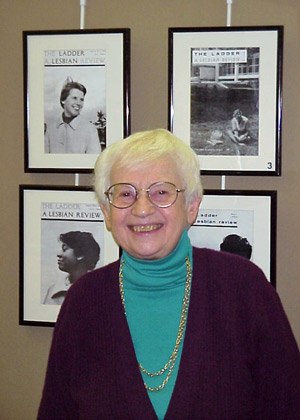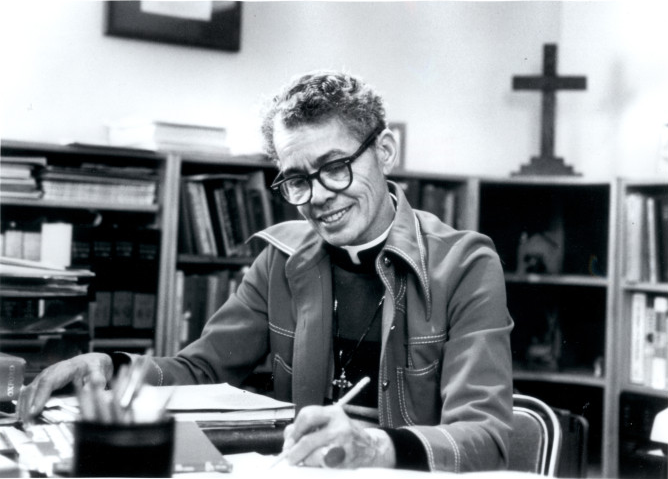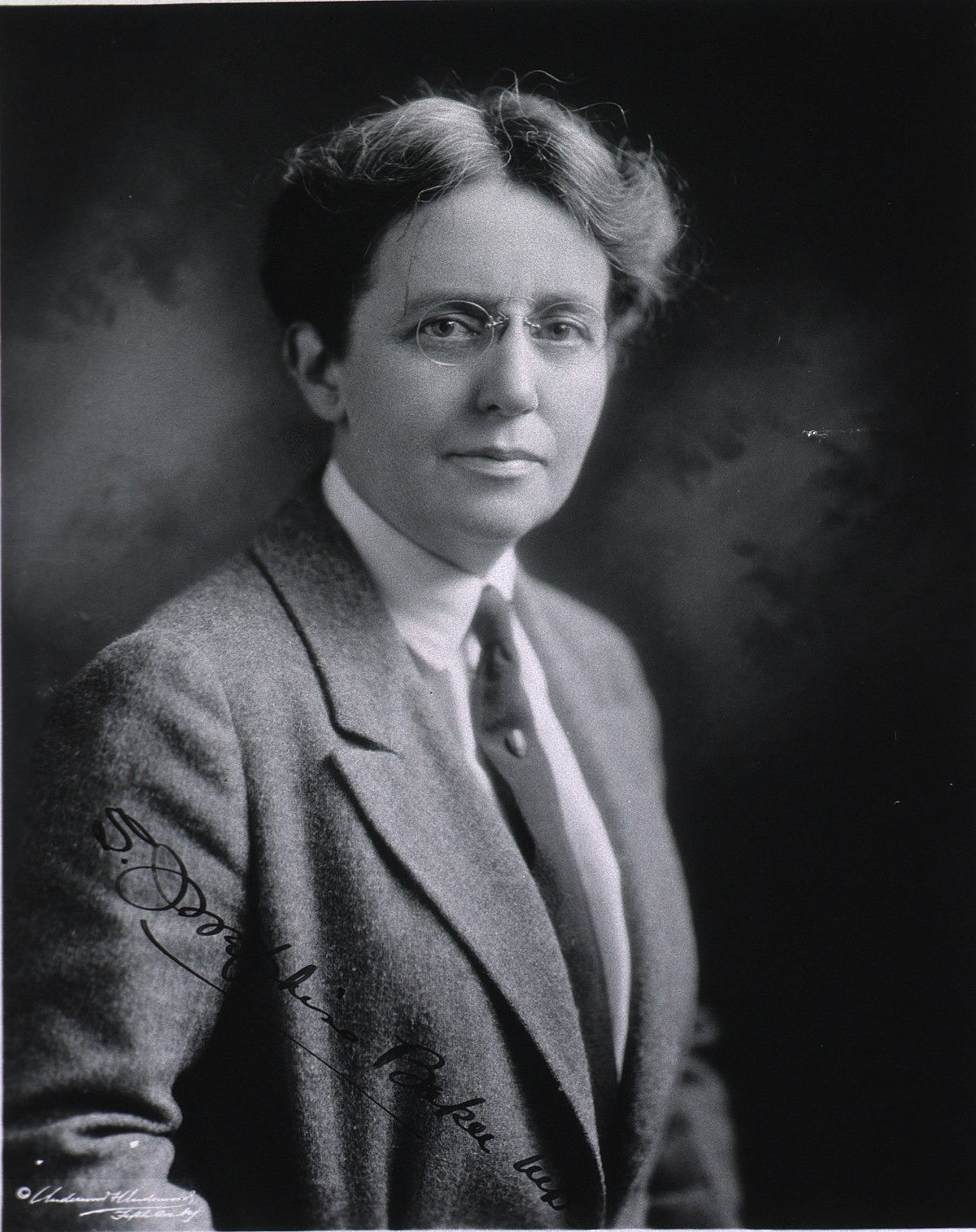Highlights of Prominent Figures in the Pride Community

June is widely recognized as Pride Month – a time to celebrate the contributions and achievements of 2SLGBTQIA+ identifying individuals and those who have made a great impact to the community. To celebrate, the SWC team has curated a list of pioneers who have contributed to the field of health & wellness.

Kay Lahusen (1930-2021)
Kay Lahusen was a pioneering 2SLGBTQIA+ rights activist born in 1930 and used her photography to challenge and change public perceptions of the gay community. Alongside her partner, Barbara Gittings, Lahusen contributed to era-changing moments in LGBTQ+ history. Some of her efforts included her role in persuading the American Psychological Association to remove homosexuality from its list of mental disorders in 1973. Her work with “The Ladder,” where she was the first to feature real lesbians on the cover, not only provided visibility but also made a sense of pride and identity within the 2SLGBTQIA+ community. Through her images and advocacy, Lahusen helped lay the groundwork for a more inclusive society, making her contributions some of the most transformative in the movement’s history.

Dr. John Fryer (1937–2003)
Dr. John Fryer was an American psychiatrist and courageous gay rights activist. He is well known for his transformative speech at the 1972 American Psychiatric Association (APA) annual conference. Speaking anonymously as Dr. Henry Anonymous, Fryer disclosed his homosexuality to challenge psychiatric norms and advocated for the declassification of homosexuality as a mental disorder. His expression of his struggles with discrimination within his professional life, significantly influenced the APA’s landmark decision in 1973 to remove homosexuality from its Diagnostic and Statistical Manual of Mental Disorders. This marked an important step forward in the 2SLGBTQIA+ rights movement, as it changed the course of psychiatric treatment for homosexuals. Dr. Fryer’s work efforts in declassifying homosexuality as a mental disorder is considered a milestone in the fight for 2SLGBTQIA+ rights. To honour his contributions, the APA established the “John E. Fryer, M.D., Award,” commemorating his lasting impact on mental health and 2SLGBTQIA+ rights.

Dr Pauli Murray (1910-1985)
Dr. Pauli Murray was a pioneering African-American woman, lawyer, writer, and civil rights activist, whose extensive work laid crucial foundations for recognizing gender discrimination and advancing 2SLGBTQIA+ rights in healthcare and other sectors. As an openly lesbian individual, Murray’s experiences with racism and discrimination fueled her exploration of intersectionality, significantly influencing her seminal book, Proud Shoes: The Story of an American Family. This work spoke about the complexities of racial and gender identity. It advocated for an inclusive feminism that embraced the unique challenges faced by women of colour.
In 1977, Murray broke significant barriers by becoming one of the first African-American women ordained as an Episcopal priest, integrating her deep faith with her activism and creating a platform for dialogue on equality within religious spaces. Her relentless advocacy tackled issues of sexism, homophobia, racism, and economic disparity, emphasizing the importance of equality in healthcare and representation in all fields. Dr. Murray’s legal skillset, along with her compelling writings and speeches inspired a more inclusive feminist movement and fortified the fight for civil rights across multiple marginalized communities. Her enduring legacy continues to inspire and guide contemporary movements for social justice and equality

Dr. Magnus Hirschfield (1868-1935)
Dr. Magnus Hirschfield was a German doctor and sexologist renowned for his early and influential advocacy for 2SLGBTQIA+ rights. Hirschfeld dedicated his career to the study of sexuality, aiming to reduce stigma and improve the lives of 2SLGBTQIA+ individuals through scientific understanding and legal reform. In 1897, he co-founded the Scientific Humanitarian Committee, one of the first organizations to champion gay and transgender equality, advocating for the decriminalization of homosexual relationships and gaining notable support from other scientists & experts, including Albert Einstein. Hirschfeld’s work extended beyond advocacy; his clinical practice provided critical insights into the traumatic impacts of societal abuse and stigmatization on LGBTQIA+ individuals, many of whom suffered greatly under prevailing prejudices. His efforts were pioneering in the recognition of gender nonconformity, arguing for the existence of more than the traditional male and female classifications and providing some of the first medical treatments and support for transgender people.
Despite his contributions, Hirschfeld’s career was marred by severe challenges, including violent attacks by German nationalists and the eventual raid and closure of his Institute for Sexual Science in 1933. Fleeing to France for safety, Hirschfeld’s work nevertheless laid foundational theories in sexology and significantly advanced the conversation around human sexuality and 2SLGBTQIA+ rights, leaving a legacy that continues to inspire the field of healthcare and beyond.

Dr Alan Hart (1890-1962)
Dr. Alan Hart is celebrated as one of the first individuals to undergo female-to-male gender reassignment surgery, marking a significant moment in transgender medical history. Born into a society that misunderstood his gender identity, Hart experienced early alienation and sought medical intervention to align his physical appearance with his male identity. After graduating from the University of Oregon Medical School in 1912, he underwent a pioneering hysterectomy in 1917, which he believed was essential for living authentically as a man. Post-transition, Hart pursued a career in medicine, focusing particularly on tuberculosis research. He aided in developing innovative X-ray photography techniques to detect tuberculosis, significantly impacting public health efforts during a time when the disease was a major killer in the United States. His screening programs drastically reduced tuberculosis mortality rates, saving countless lives. Aside from his medical achievements, Hart was also a prolific writer, authoring four novels that incorporated themes of medicine and sexuality, reflecting his personal experiences and challenges. Dr. Alan Hart’s legacy transcends his medical and literary contributions; he is a pivotal figure in the history of transgender rights, his life and work continue to inspire advancements in medical science and the ongoing fight for equal rights for transgender individuals.

Bruce Voeller (1934-1994)
Bruce Voeller was a biologist and AIDS researcher, as well as a key figure in the gay rights movement. Born in Minneapolis and educated at Reed College and the Rockefeller Institute, Voeller’s awareness of his homosexuality from an early age shaped his career and activism. At 29, he openly embraced his identity and began merging his scientific expertise with advocacy. In 1973, he co-founded the National Gay Task Force, a pioneering organization in the history of 2SLGBTQIA+ rights in America, notable for being one of the first to engage directly with White House officials.
During the AIDS crisis in the early 1980s, Voeller played a crucial role in renaming the disease to Acquired Immune Deficiency Syndrome (AIDS), moving away from the stigmatizing Gay-Related Immune Defense Disorder (GRIDD). His efforts helped shift the public and medical community’s perception of the disease, fostering a more scientific and compassionate approach to its treatment and understanding.
Bruce Voeller’s pioneering contributions to both science and 2SLGBTQIA+ rights have left an indelible mark, inspiring ongoing advocacy and research efforts in these intertwined fields until his death from AIDS-related complications in 1994.

Dr. Sara Josephine Baker (1873-1945)
Dr. Sara Josephine Baker, known as “Dr. Jo,” was a pioneering public health physician whose innovative strategies drastically reduced infant mortality rates in early 20th-century New York City. Her comprehensive public health measures focused on preventative care, hygiene, and education, notably introducing silver nitrate drops to prevent newborn blindness from gonorrhea. Additionally, Dr. Baker played a critical role in identifying “Typhoid Mary” Mallon, highlighting the complexities of managing asymptomatic carriers of infectious diseases. Beyond her public health achievements, Dr. Baker was the first woman to earn a doctorate in public health from New York University, advocating for broader societal changes to improve health outcomes.
Dr. Baker’s openness about her sexuality and her relationship with writer Ida Wylie marked her as a significant figure within the 2SLGBTQIA+ community. Living openly during an era of widespread stigmatization, she was part of the radical feminist group Heterodoxy, which pushed against gender and sexual norms. Her life demonstrated the possibility of a successful and fulfilling professional and personal life despite societal prejudices. Baker’s contributions to public health and her role as a visible 2SLGBTQIA+ figure continue to inspire progress in both fields, embodying the intersection of health advocacy and the fight for 2SLGBTQIA+ rights.

Dr. Evelyn Hooker (1907-1996)
Dr. Evelyn Hooker was a pioneering psychologist whose research in the 1950s fundamentally changed the perception of homosexuality in psychology. Her study, “The Adjustment of the Male Overt Homosexual,” published in 1957, provided groundbreaking evidence that challenged the prevailing view of homosexuality as a mental disorder. Hooker recruited 60 male participants, half of whom were gay and the other half heterosexual, and used established psychological tests analyzed blindly to ensure objectivity. Her findings showed no significant differences in the mental health of the two groups, demonstrating that homosexual men were as well-adjusted as their heterosexual counterparts. This study was revolutionary, undermining the justification for harmful practices like conversion therapy and influencing the American Psychiatric Association’s decision to remove homosexuality from the DSM in 1973.
Beyond her research, Hooker was a vocal advocate for gay rights, using her platform to promote a more humane and scientifically accurate understanding of homosexuality. Her work was important in shifting public and professional perceptions, contributing to broader societal acceptance. Hooker’s contributions extend beyond her famous study, as she helped lay the groundwork for modern 2SLGBTQIA+ psychology and played a crucial role in the fight against discrimination. Her legacy is celebrated for its rigorous methodology and social impact, earning her numerous accolades, including the APA’s Award for Distinguished Contributions to Psychology in the Public Interest in 1991. Dr. Evelyn Hooker’s work remains a pillar in the field, inspiring continued efforts toward equality and de-stigmatization of 2SLGBTQIA+ identities
In celebrating the lives and contributions of these remarkable 2SLGBTQIA+ pioneers, we honour their enduring impact on health and wellness, recognizing their roles in advancing equality, reducing stigma, and inspiring future generations to continue their fight for justice and inclusion.
References
New York Times: https://www.nytimes.com/2021/05/27/us/kay-tobin-lahusen-gay-rights-activist-and-photographer-dies-at-91.html
American Psychiatry and Homosexuality Oral History: https://books.google.ca/books?id=k_aXd1lW3FsC&dq=%22john+e.+fryer%22+oxymoron&pg=PA15&redir_esc=y#v=onepage&q=%22john%20e.%20fryer%22%20oxymoron&f=false
New York Historical Society- Museum and Library: https://wams.nyhistory.org/confidence-and-crises/world-war-ii/pauli-murray/
United States Holocoust Memorial Museum: https://encyclopedia.ushmm.org/content/en/article/magnus-hirschfeld-2
Oregon Historical Society: https://www.oregonencyclopedia.org/articles/hart_alan_1890_1962_/
National Institute of Health: https://www.ncbi.nlm.nih.gov/pmc/articles/PMC1470556/#:~:text=Baker%20founded%20the%20American%20Child,York%20University%20School%20of%20Medicine).
American Psychology Association (APA): https://www.apa.org/monitor/2011/02/myth-buster
Mental Health & Mental Illness, Physical Health, Sexual Health